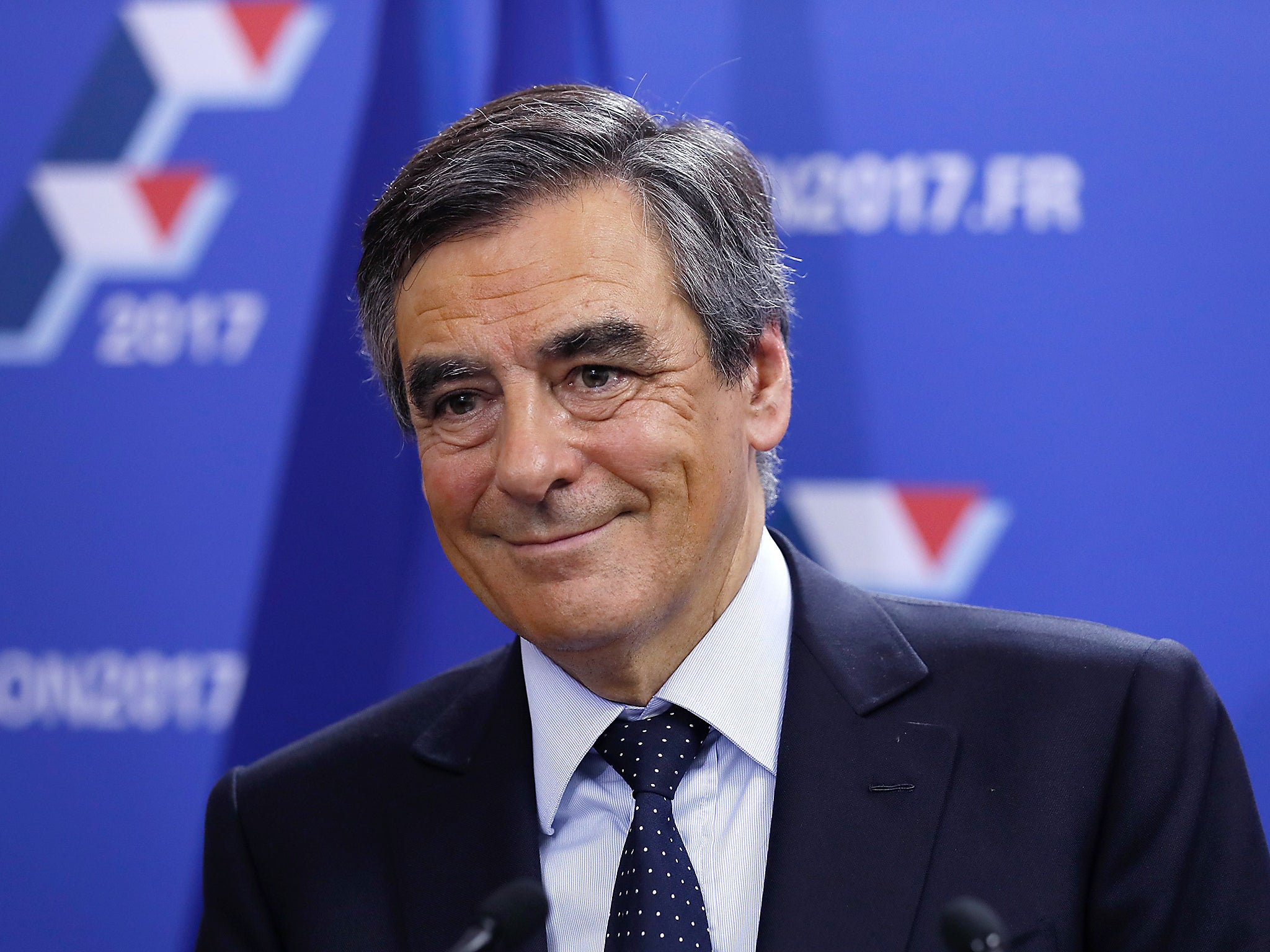We now know who's likely to become France's new President – the effects on Brexit and the fight against Isis will be huge
Fillon doesn't seem to have the big problem with Brexit that other European leaders might. He also thinks it wrong to see Russia as the sole cause of trouble in Ukraine. And he would like to see a coalition between Russia and Iran to defeat Isis in Syria


Your support helps us to tell the story
From reproductive rights to climate change to Big Tech, The Independent is on the ground when the story is developing. Whether it's investigating the financials of Elon Musk's pro-Trump PAC or producing our latest documentary, 'The A Word', which shines a light on the American women fighting for reproductive rights, we know how important it is to parse out the facts from the messaging.
At such a critical moment in US history, we need reporters on the ground. Your donation allows us to keep sending journalists to speak to both sides of the story.
The Independent is trusted by Americans across the entire political spectrum. And unlike many other quality news outlets, we choose not to lock Americans out of our reporting and analysis with paywalls. We believe quality journalism should be available to everyone, paid for by those who can afford it.
Your support makes all the difference.It is good news for this country that François Fillon has succeeded in positioning himself as the likely candidate for the Republican Party in France’s presidential election, due to be held next April. In fact a recent poll showed Fillon beating the National Front’s Marine Le Pen, who is second favourite. He would obtain 61 per cent of the votes were the two to meet in a second and final round. So Fillon will very likely displace the hapless François Hollande from the Elysée in 2017 just when our Brexit negotiations are reaching a crucial stage.
So we should look carefully at Fillon, who on Sunday decisively won the first round of the Republican Party’s primary elections, forcing former president Nicholas Sarkozy into unwanted retirement on the way. And while there are lots of interesting aspects to Fillon’s domestic policy plans, note first where he stands on Europe.
He believes in a “Europe of Nations” that would be “respectful of the sovereignty of France” – and no doubt of Britain, too. In his policy statement, Fillon argues that Europe must be a means of achieving certain ends and not a religion. In particular he would make the Schengen area – 26 European states, not including Britain, that have officially abolished passport control at their mutual borders – a “Schengen of Justice”, meaning that anyone found guilty of a crime anywhere in the area would automatically be sent back to their own country. With these opinions, Fillon sounds very much like somebody with whom Theresa May could do business.
More than that, there are other points of similarity between the two politicians. He represents the traditional right wing of politics in France, which is, to quote Le Monde, quite liberal, often Catholic and concerned with questions of identity. In fact, Fillon is as much a traditional Catholic as May is a traditional Anglican.
It is interesting, too, to analyse why in the opinion polling before Sunday, Alain Juppé suddenly appeared to fall back while Fillon forged ahead. The turning point seems to have Juppé’s courting of MoDem, a centrist political party founded by François Bayrou. It seems that Fillon’s supporters have as little enthusiasm for centre-ground politics as May’s Conservatives would have for another coalition with the Lib Dems.
Another plus for Fillon in May’s estimation is likely to be that he is an admirer of Margaret Thatcher. He showed a Thatcher-like frankness in expression and a deploring of excessive debt when, soon after becoming Prime Minister in 2007, he told an audience in Corsica that he was at the head of a “bankrupt state”. His President, Sarkozy, was not amused. Now in his plans for his own presidency, he proclaims bravely that he would cut 500,000 public sector jobs in five years. He would also ditch the controversial 35-hour week legislation. Companies would be able to negotiate whatever length of working week they preferred up to a limit of 48 hours.
Finally, there is an upright way of handling themselves in private as well as in public that unites Fillon and May. For instance, Sarkozy’s numerous brushes with the law over party funding have genuinely shocked Fillon. When he began his campaign he exclaimed: “Can you imagine De Gaulle having to deal with criminal charges?”
Nor could he be further from the “bling-bling” for which Sarkozy was famous. No doubt he has similar concerns about President Hollande’s comportment in office. As Valerie Trierweiller, Hollande’s official partner living at Elysée, asked when she discovered he was playing loose: “Where is the exemplary President? A President does not conduct two wars and at the same time dash off to meet an actress in a side street when the opportunity presents itself.”
Nonetheless, there is one big difference between Fillon and May that may surprise – their attitude to President Putin. Fillon seems to take President-elect Trump’s line. Fillon and Vladimir Putin have met numerous times since 2012. Fillon thinks it wrong to make Russia the sole cause of trouble in Ukraine. And he would like to see a coalition between Russia and Iran to defeat Isis in Syria.
Would that mean having to ally France with the Syrian president, Bashar Al-Assad? Yes, if necessary. That is a difference with Britain’s policy. Nonetheless, Theresa May could well think, bring on Fillon.
Join our commenting forum
Join thought-provoking conversations, follow other Independent readers and see their replies
Comments